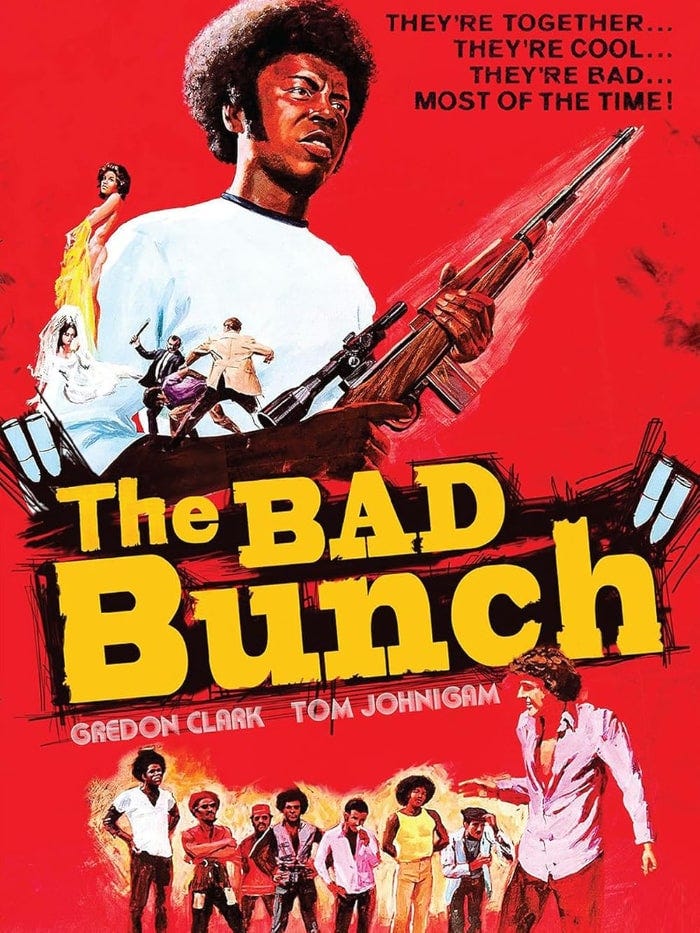The Bad Bunch
a.k.a. Tom
Written by Greydon Clark and Alvin L. Fast
Directed by Greydon Clark
1973
While there were a fair number of Blaxploitation movies made by members of the target audience, most of them were written and/or directed by white people. That’s likely due to the fact that white filmmakers were more likely to get the funding needed to make movies through the Hollywood system. However, these filmmakers still recognized who their target audience was, and the best movies in the genre are those that addressed the concerns of the Black community and provided heroes that people could look up to and aspire to emulate.
Whenever something resonates with non-white audiences, there’s always a contingent of people who say, “But what about the white people? Can’t they be involved too?” While white people are often welcomed in social and artistic movements alongside other races, there are some who try to force themselves in when they aren’t necessarily welcome, and when they try to make their own versions of popular art, they’re likely to pale in comparison to the real thing. The Bad Bunch provides yet another example of this, with a white filmmaker trying to make a white version of a Blaxploitation movie and failing in nearly every way.
The movie seems like a passion project of director Greydon Clark (better known for lame 80s movies like Joysticks and The Forbidden Dance), who also co-wrote the screenplay and starred as the main character. He plays Jim, a Vietnam veteran who was emotionally affected when a Black soldier friend of his was killed right next to him. After getting home, he goes to pay his respects to his friend’s father, but when traveling to Watts to do so, he gets accosted by his friend’s brother, who, along with several other young Black men, treats him with hostility.
The brother (Tom Johnigarn) is named Tom, but he says that’s his slave name and insists on being called Makimba. He and his friends call Jim a honky and tell him to get out of the neighborhood, and when he doesn’t do so immediately, they chase him down and start to beat him up. But before they can do much, they get interrupted by a couple of white cops who call them racial slurs and threaten to arrest them or maybe just shoot them. However, Jim is the saintly type of white person who bears them no ill will, so he convinces the cops to leave them alone.
The rest of the movie follows Jim as he struggles to reintegrate into regular life, while also regularly checking back in with Tom/Makimba as he gets more and more hostile toward Jim, eventually taking violent actions. There’s really not much to the story here, and the movie cares much more about Jim’s travails than anything else. An inordinate amount of the movie is concerned with whether he’ll be able to get back together with his old girlfriend or whether he’ll derail this relationship by messing around with a hippie chick that he met. Unfortunately, nothing about him is compelling, probably because Greydon Clark’s acting skills are even less impressive than his directorial vision. Jim is a character that could generously be called soft-spoken, but it would be more apt to say that he’s boring and personality-free.
If whatever happens to Jim is less than compelling, one would hope that there would be some effort to make things interesting on the other side of the racial divide. But no, the film fails in that respect as well. It doesn’t provide any reason for Tom’s animosity toward Jim and almost everyone else. He’s just angry all the time, and while there are certainly some valid reasons to be upset about the ongoing oppression that affects his people, the movie makes it seem like he’s being unreasonably hostile. It smacks of both-sidesism, with the racist cops and the angry Black people being equally responsible for whatever violence may happen.
All of this makes the movie a pretty tiresome slog as it wanders toward an unsatisfying ending. The opening credits feature a pretty terrible theme song called “N***** Lover” by Sheldon Lee, which sets the tone for the movie to come. We spend interminable amounts of time watching Jim struggle with whether he wants to get married, which is so uninteresting that even he can barely bring himself to care. There’s so little that actually happens throughout that movie that it resorts to an extended pool party scene in which a bunch of women strip off their clothes and go skinny dipping. With a movie that had less than nothing to actually say and no idea how to go about making any of it worth watching, we all would have benefited if it had been lost to history.
Blaxploitation Education index:
UpTight
Cotton Comes to Harlem
Watermelon Man
The Big Doll House
Shaft
Sweet Sweetback’s Baadasssss Song
Super Fly
Buck and the Preacher
Blacula
Cool Breeze
Melinda
Slaughter
Hammer
Trouble Man
Hit Man
Black Gunn
Bone
Top of the Heap
Across 110th Street
The Legend of N***** Charley
Don’t Play Us Cheap
Shaft’s Big Score!
Non-Blaxploitation: Sounder and Lady Sings the Blues
Trick Baby
The Harder They Come
Black Mama, White Mama
Black Caesar
The Mack
Book of Numbers
Charley One-Eye
Ganja & Hess
Savage!
Coffy
Shaft in Africa
Super Fly T.N.T.
Scream Blacula Scream
Cleopatra Jones
Terminal Island
Gordon’s War
Slaughter’s Big Rip-Off!
Detroit 9000
Hit!
The Spook Who Sat by the Door
The Slams
Five on the Black Hand Side
The Black 6
Hell Up in Harlem
I Escaped From Devil’s Island
Blackenstein





"the saintly type of white person who bears them no ill will..." Also known nowadays as The White Savior, who is not needed as much today as he once was in Hollywood.